This month’s open thread for climate science. Probably a good time to discuss attribution for extreme heat, wildfires, hurricane intensity and intense precipitation.
Climate Science
Unforced Variations: Jun 2021
This month’s open thread for climate science. Start of the meteorological summer, official hurricane season (outlook), the final stretches of the IPCC AR6 review process and a rare conjunction of Father’s Day and the summer solstice. Please stay on topic.
Why is future sea level rise still so uncertain?
Three new papers in the last couple of weeks have each made separate claims about whether sea level rise from the loss of ice in West Antarctica is more or less than you might have thought last month and with more or less certainty. Each of these papers make good points, but anyone looking for coherent picture to emerge from all this work will be disappointed. To understand why, you need to know why sea level rise is such a hard problem in the first place, and appreciate how far we’ve come, but also how far we need to go.

Unforced Variations: May 2021
Nenana Ice Classic 2021
And…. it’s that time again. The clock stopped on the Nenana ice classic this afternoon (April 30, 12:50pm AT). This is pretty much on trend and unsurprising given the relatively slightly cool winter in Alaska. The jackpot on offer this year was $233,591 but will likely be shared among several winners. This year’s ‘break up’ is a little odd, since the ice moved sufficiently to trigger the clock, but not enough to actually topple the tripod (which is still visible as this is being written (9pm ET) – Update 10:30pm ET: gone now though!). But, the rules are the rules…
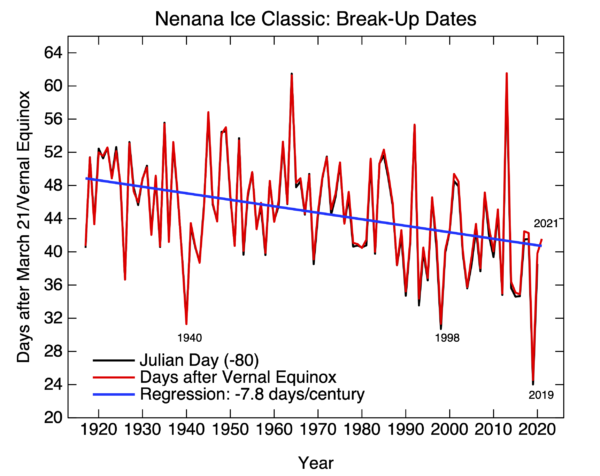
The trends in the break up date is about 8 days earlier per century (±4), estimated over the whole record, but substantially faster over the last 50 years (16 ± 12 days/century, 95% CI).
Other phenological records show similar trends, notably the longest cherry blossom record from Kyoto which dates back to 9th Century, and which had a record earliest peak bloom this year and a clear trend over the last few decades:
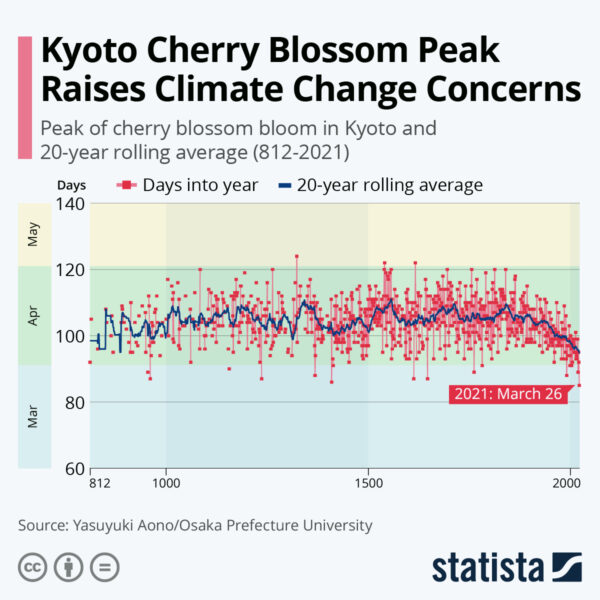
Feel free to link to your favorite such record in the comments…
Two graphs show the path to 1.5 degrees
In the Paris Agreement, just about all of the world’s nations pledged to “pursue efforts to limit the temperature increase to 1.5 degrees Celsius above pre-industrial levels”. On Saturday, the top climate diplomats from the U.S. and China, John Kerry and Xie Zhenhua, reiterated in a joint statement that they want to step up their climate mitigation efforts to keep that goal “within reach”.
But is that still possible? Here are two graphs.
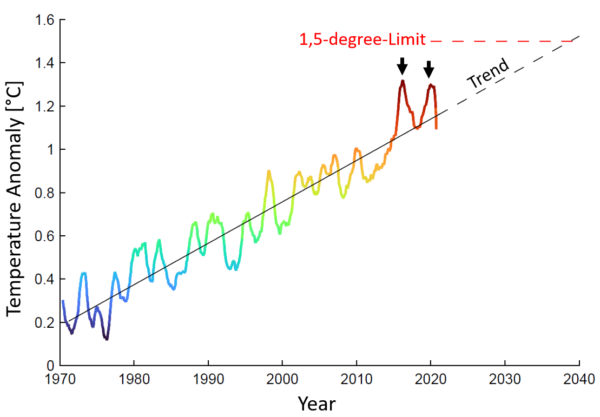
The first graph shows the global temperature trend. Warming has progressed essentially linearly for fifty years in response to increasing CO2 emissions. Although the latter accelerate the rise of CO2 in the atmosphere, on the other hand, radiative forcing (which causes warming) increases only with the logarithm of CO2 concentration, and therefore roughly linearly since the 1970s. Any acceleration of warming over the last decade is not a significant trend change. It is linked to two El Niño events in recent years, but that is part of natural variability. Does anyone remember the discussion about the supposed “warming pause” in the early 2000s? It also never was statistically significant, nor did it signify a trend change.
Therefore, if emissions continue to grow, we expect a further roughly linear increase in temperature, which would then exceed 1.5 degrees around 2040. If we lower emissions, the trend will flatten out and become roughly horizontal as we reach zero emissions. Therefore, these observational data do not argue against the possibility to still keep warming below 1.5°C.
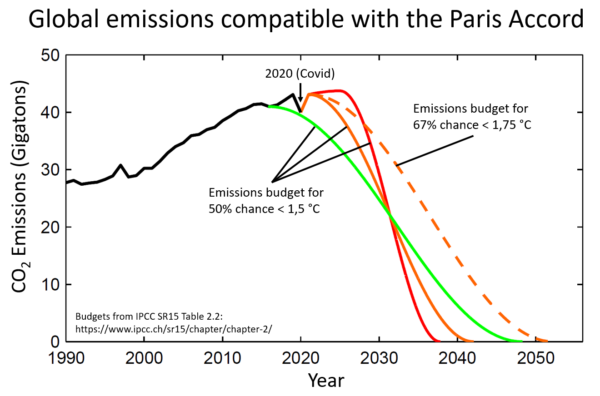
The second graph shows global CO2 emission trajectories with which we can still limit warming to 1.5 °C, at least with 50:50 probability. This means: given the uncertainties, this could also land us at 1.6 degrees, but with a bit of luck, it could land us a bit below 1.5 degrees. The core conclusions:
- It is not yet impossible to keep warming below 1.5 °C.
- This requires roughly a halving of global CO2 emissions by 2030 (as already stated in the IPCC 1.5 degree report).
- If the world dithers for another ten years before emissions fall, it will no longer be possible (red curve).
It should be noted that I have not assumed net-negative emissions here. Many scenarios assume that we first emit too much and that our children then have to pull CO2 out of the atmosphere after mid-century – I think this is not very realistic and also ethically questionable. I think we will probably not be able to achieve more than reducing global emissions to net zero. Even that would require CO2 sinks to compensate for unavoidable residual emissions, e.g. from agriculture.
Conclusion: The limitation to 1.5 degrees is still possible and from my point of view also urgently advised to avert catastrophic risks, but it requires immediate decisive measures. I am curious to see what the climate summit scheduled by US President Joe Biden will bring in the coming days!
Link
Fact check by Climate Analytics to the claim that we can no longer limit warming to 1.5°C.
This article originally appeared in German at KlimaLounge.
Should the official Atlantic hurricane season be lengthened?
By Jim Kossin, Tim Hall, Mike Mann, and Stefan Rahmstorf
The 2020 Atlantic hurricane season broke a number of records, with the formation of an unprecedented 30 “named storms” (storms that reach wind-speed intensity of at least 18 m/s and are then given an official name). The season also started earlier than normal. In fact, when ranked by their order in the season, the date of formation of every named storm, from Tropical Storm Arthur to Hurricane Iota was substantially earlier than normal (Fig. 1).
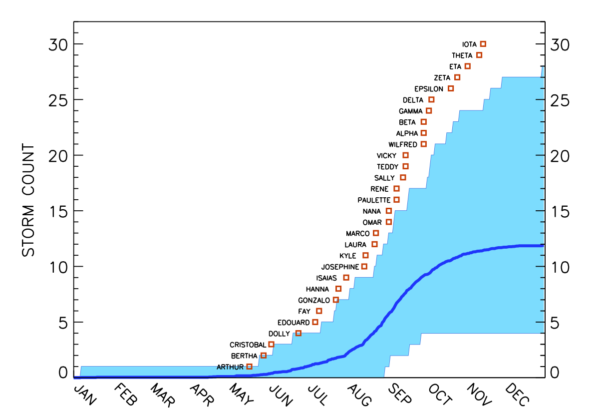
Unforced Variations: Apr 2021
A potential rule of thumb for hourly rainfall?
Future global warming will be accompanied by more intense rainfall and flash floods due to increased evaporation, as a consequence of higher surface temperatures which also lead to a higher turn-around rate for the global hydrological cycle. In other words, we will see changing rainfall patterns. And if the global area of rainfall also shrinks, then a higher regional concentration of the rainfall is bound to lead to more intense downpours (the global rainfall indicator is discussed here).
[Read more…] about A potential rule of thumb for hourly rainfall?The Rise and Fall of the “Atlantic Multidecadal Oscillation”
Two decades ago, in an interview with science journalist Richard Kerr for the journal Science, I coined the term the “Atlantic Multidecadal Oscillation” (AMO) to describe an internal oscillation in the climate system resulting from interactions between North Atlantic ocean currents and wind patterns. These interactions were thought to lead to alternating decades-long intervals of warming and cooling centered in the extra-tropical North Atlantic that play out on 40-60 year timescales (hence the name). Think of the purported AMO as a much slower relative of the El Niño/Southern Oscillation (ENSO), with a longer timescale of oscillation (multidecadal rather than interannual) and centered in a different region (the North Atlantic rather than the tropical Pacific).
Today, in a research article published in the same journal Science, my colleagues and I have provided what we consider to be the most definitive evidence yet that the AMO doesn’t actually exist.
[Read more…] about The Rise and Fall of the “Atlantic Multidecadal Oscillation”